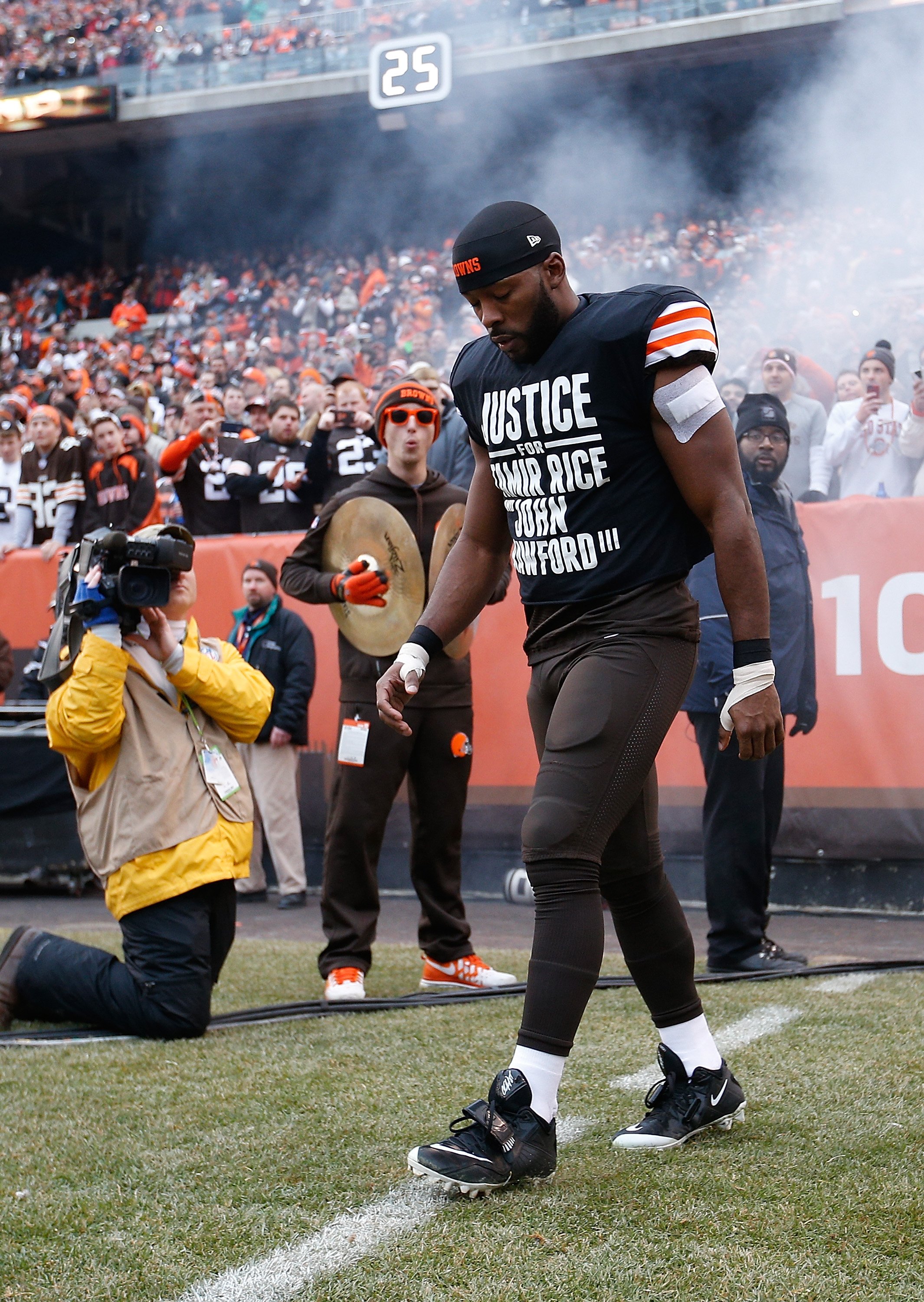
On Sunday, Cleveland Browns wide receiver Andrew Hawkins wore a t-shirt that said “Justice For Tamir Rice And John Crawford III.” Rice, a 12-year-old, was shot by a Cleveland police officer in a park last month; the boy had been carrying a toy gun. Crawford was shot by police in in Beavercreek, Ohio, a suburb of Dayton, while holding an air rifle in a Walmart this summer; a grand jury did not indict any officers.
“It’s pretty pathetic when athletes think they know the law,” Jeff Follmer, president of the Cleveland police union, wrote in a statement to a local TV station. “They should stick to what they know best on the field. The Cleveland police protect and serve the Browns stadium and the Browns organization owes us an apology.”
Neither the Browns nor Hawkins said “I’m sorry.”
On November 30, five St. Louis Rams players made the “hands up, don’t shoot” pose during game introductions, in support of Michael Brown and Ferguson protestors. The St. Louis police union was similarly peeved. It released a statement saying the officers were “profoundly disappointed with the members of the St. Louis Rams football team who chose to ignore the mountains of evidence released from the St. Louis County Grand Jury this week and engage in a display that police officers around the nation found tasteless, offensive and inflammatory.” The union called for player discipline and “a very public apology” from the NFL and the Rams. Although the police organization and the Rams debated whether private correspondence between a team official and the union qualified as an apology, the team publicly stood by its players.
Public opinion has moved against police officers. Some misguided people are painting them with a broad brush, saying all cops are bad. As the son of a retired New York City police sergeant, I strongly disagree with this sentiment. That’s why I’m asking police unions to please stop belittling professional athletes.
These apology demands come off as defensive. They don’t help public perception; they don’t help the tense relationship between law enforcement and many communities. These athletes aren’t painting all cops as racists. They are exercising a right to free speech. The right to believe that a 12-year-old boy should not have been shot. To believe that an unarmed Michael Brown did not deserve to die. Sure, officer Darren Wilson said Brown never raised his hands to surrender. A few witnesses said he did. The St. Louis Rams have a right to believe the witnesses.
And why single out athletes for reprimand? Unions don’t seem to be firing out angry letters to peaceful protestors. To be fair, not every union is singling out athletes. Before a December 8 game in Brooklyn, NBA stars LeBron James, Kyrie Irving, Deron Williams, Kevin Garnett, and other players wore “I Can’t Breathe” shirts in warmups, to protest the death of Eric Garner, the Staten Island man who died after an officer put him in a chokehold. He uttered “I can’t breathe” before he died; a grand jury acquitted the officer. The New York police union did not publicly blast the players.
And official police department representatives generally have been much more measured. Cleveland Division of Police Chief Calvin D. Williams said on Tuesday: “The Division of Police respects the rights of individuals to peacefully demonstrate their personal views and opinions. Mr. Hawkins was certainly well within his rights to express his views and no apology is necessary.”
Yes, athletes have a larger platform than the average dissenter to spread a message. But if you don’t agree with the message, that doesn’t mean you go after them. Jocks have a first amendment right not to stick to sports. Why should law enforcement chastise law-abiding athletes?
More Must-Reads From TIME
- The 100 Most Influential People of 2024
- The Revolution of Yulia Navalnaya
- 6 Compliments That Land Every Time
- What's the Deal With the Bitcoin Halving?
- If You're Dating Right Now , You're Brave: Column
- The AI That Could Heal a Divided Internet
- Fallout Is a Brilliant Model for the Future of Video Game Adaptations
- Want Weekly Recs on What to Watch, Read, and More? Sign Up for Worth Your Time
Write to Sean Gregory at sean.gregory@time.com